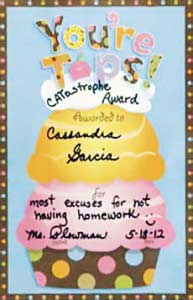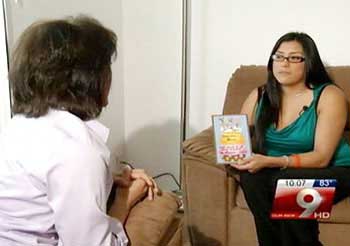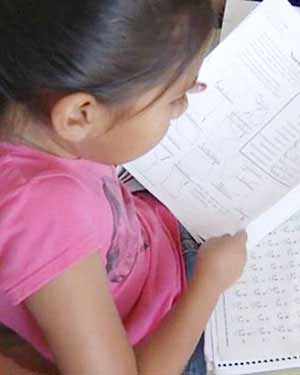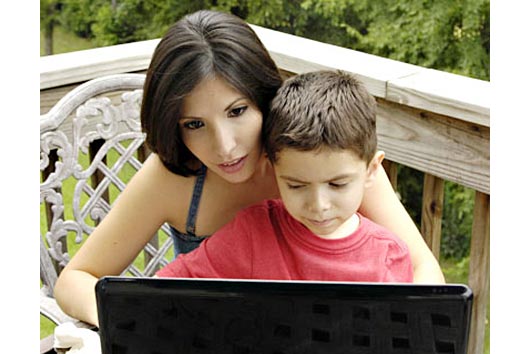
Christina Valdez, the mother of an 8-year-old girl who was singled out by her teacher for not doing her homework with a “catastrophe award,” says she is shocked by the attention this story is receiving.
Two weeks ago, her daughter, Cassandra came home from school distraught with a certificate given to her by her teacher in front of the entire class: “You’re Tops! Catastrophe Award. Awarded to Cassandra Garcia. For Most Excuses for Not Having Homework.”
Angry to see her child so upset, Valdez asked the principal to discipline the teacher and issue an apology. But the principal told Valdez the award was just a joke and not to take it too seriously.
So Valdez took it to the media and she unwittingly struck a nerve.
“I never intended for it to be viral like this. I was speechless when I found out,” she said in a telephone interview. “All I wanted was acknowledgement from the principal that what the teacher did was wrong. Who knows how many other children she did that to in the past?”
Cassandra’s grandmother, Eloise Vazquez, said it was unnecessary for the teacher to send her message in such a negative way. “If there is a problem, take care of the problem, but don’t humiliate the child,” she said. “It damages their self esteem.”
Read Related: Discipline Alternatives for Young Kids
 Neither the school principal nor the teacher at Desert Springs Academy in Tucson, Arizona, returned calls requesting an interview. But today, the school issued the following statement: “It has come to our attention that an inappropriate award was given to you by your teacher. The Governing Board of Desert Springs Academy sends our heartfelt apology to you and your mother. It has been a pleasure to have had you as a student since kindergarten and wish you well at your new school.” —Sincerely, Lydia Capara—Governing Board President.
Neither the school principal nor the teacher at Desert Springs Academy in Tucson, Arizona, returned calls requesting an interview. But today, the school issued the following statement: “It has come to our attention that an inappropriate award was given to you by your teacher. The Governing Board of Desert Springs Academy sends our heartfelt apology to you and your mother. It has been a pleasure to have had you as a student since kindergarten and wish you well at your new school.” —Sincerely, Lydia Capara—Governing Board President.
On her blog, Cassandra’s teacher, Mrs. Plowman thanks her students and parents for the flowers, notes, chocolates and food gifts she received at the end of the year. “I am so grateful for your kindness, support and active caring displayed throughout the year,” she wrote in her last entry on May 18.
 WORDS OF SUPPORT AND HATE FOR MOM
WORDS OF SUPPORT AND HATE FOR MOM
On Yahoo.com the story elicited 64,434 comments—many of them critical of Valdez, accusing her of being an absent parent who did not supervise her child’s homework completion and for going to the media with her story and bringing more attention to her daughter’s embarrassment.
Maybe the mom should get an award for not giving a crap about her kid’s education. As for the kid, it’s a fair lesson. In the real world, no boss cares what excuse you give, only that you DO YOUR JOB! If you don’t there are consequences plain and simple. —Tim on Yahoo.com.
Other uglier comments raged at her being an “illegal” (she was born in the U.S.). They seethed, “Go back to Mexico!” and to stop “partying” at night and “dancing on tables.”
I heard that the educational system in Mexico is much friendlier, how about giving it a try... from Chuck also on Yahoo.com.
But Valdez says she is just a normal working-class American mom with three kids doing the best she can. The 30-year-old office manager in a Tucson orthopedic center says she is going to community college in the evenings to complete her bachelor’s degree in human resources and administrative work.
“The comments are outrageous,” she said. “Homework is a big issue in my family. Cassandra has been going to this school since kindergarten. She has received achievement awards and recognition awards.”
Cassandra and her mom have received some supportive comments. One person agreed with Christina’s assessment of the teacher.
This teacher is a bully!!! wrote Laurie Koller on KGUN 9’s Facebook page.
Children are very sensitive to how adults treat others at that age. It is an age where they learn to be respectful of others no matter what their faults are or it could turn them into bullies….It was wrong, plain and simple. Teacher was practicing and teaching bullying. —Pamela Williams via KGUN 9’s Facebook page
 HOMEWORK CHALLENGES
HOMEWORK CHALLENGES
But this year was challenging for Cassandra, who stayed at an after school program everyday where she was expected to finish her homework. There were several times throughout the year when Cassandra did not do her homework, Valdez acknowledged. And when that happened, Valdez said she wanted her daughter to feel the consequences. Valdez said every time the teacher sent a note home, she would call her but never received a call back from the teacher.
“Cassandra has always had a hard time with this teacher. Some assignments she was stressed out about and she wouldn’t tell me until that morning that she had not done them,” she said. “So I would tell her ‘Sorry, you have to deal with the consequences.’”
But shaming her daughter in front of the class does not inspire good work, said Valdez. Cassandra will be attending a different school in the fall.
“She was being bullied by her teacher,” said Valdez. “Cassandra had her work done and even if she didn’t it doesn’t give her teacher the right to humiliate her in front of her class like that.”
HOW TO HANDLE A SCHOOL-RELATED ISSUE
But Ilda Jimenez y West, an advisor at the University of Southern California’s Rossier School of Education, said that fixing so much attention on the award itself may not be as productive as trying to understand the intention behind it.
“The teacher wanted to capture the kid’s attention. She is trying to engage the student. Even if she didn’t get her attention through the school year now she really got her attention by giving her this award,” said Jimenez y West. “So as parents, how can we respond in a constructive manner instead of trying to assign blame? It is too complex to just point the finger at the teacher.”
This incident could serve as a life lesson that begins by asking “How did we get here?” and then evolve into thinking about the kind of lesson you want to teach your children and how to handle a perceived injustice, said Jimenez y West.
“The first step is to debrief your child and ask ‘If you have been doing your homework, why did the teacher give you this award?’” said Jimenez y West, who has a PhD in anthropology and a master’s in education. “And then I would ask myself, as a mother, how could I have assisted my daughter and facilitated a different outcome?”











